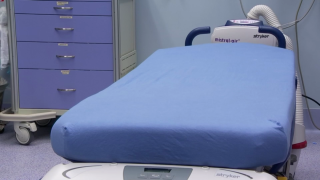
Hospital leaders in North Texas are once again preparing for the possibility they may have to choose who gets the highest levels of life-saving care, and doctors are revisiting guidelines on what goes into the decisions.
“Seriously, we need help. We need help to help you. We’re not exaggerating things,” warned Dr. Mark Casanova. “We have limited capabilities at this time. Limited bandwidth, limited staff, and the numbers are likely to outpace our capabilities.”
Casanova is a palliative care doctor, clinical ethicist, and spokesperson for the North Texas Mass Critical Care Task Force, a group made up of medical professionals, elected officials, lawyers and faith leaders who advise hospitals on how to triage patients if they run out of staff or equipment.
Recently, Casanova said the task force noticed questions about COVID-19 vaccine status bubble up.
Get DFW local news, weather forecasts and entertainment stories to your inbox. Sign up for NBC DFW newsletters.
“We hear it out there, ‘Well, we’re running tight on ICU beds, what about the non-vaccinated?” Casanova said.
Early Thursday afternoon, The Dallas Morning News published the contents of an email from task force Co-chair Dr. Robert Fine to members. The paper quoted him as writing in part:
1. “COVID-19 vaccination decreases severe infection and death. Vaccine status therefore may be considered when making triage decisions as part of the physician’s assessment of each individual’s likelihood of survival.”
2. “When vaccination status is considered, accommodations may be needed when the reason for non-vaccination is beyond the patient’s control such as but not limited to caretaker refusal to have a disabled dependent vaccinated, recent COVID-19 infection, or medical contraindication.”
3. “Many are understandably angry and frustrated with the unvaccinated, but triage must remain grounded upon likelihood of survival. Health care professionals should continue to honor duties of care and compassion.”
In an interview Thursday afternoon with NBC 5, Casanova characterized the email as a brief internal memo summarizing task force discussions for members and said vaccine status was something doctors could consider in limited situations.
However, in a second interview Thursday evening after he spoke with members of the task force, Casanova characterized the email as a “homework assignment” that members could solicit feedback on from others. Going forward, he says vaccination status will not be among the factors hospitals are told to consider when making critical care triage decisions.
“In the midst of this reconvening, and exploration and discussion with various triage committee members, the consensus is vaccination status, or more specifically a lack of a vaccine will not be considered as part of any exclusion criteria for treating patients,” he said.
In the most dire scenario, the task force guidelines advise doctors on scoring each patient for a variety of medical factors to decide which patient has the best chance of surviving with their highest level of care. In order to avoid discrimination, doctors cannot consider characteristics like race, gender, disability, age, or weight, as well as factors like religion, socioeconomic status, insurance status, or ability to pay.
“There is a great degree of neutrality that we use to approach this, but at the same time also individualizing it,” Casanova explained. “Acknowledging the uniqueness Looking at conditions, their normal, and where are they now.

